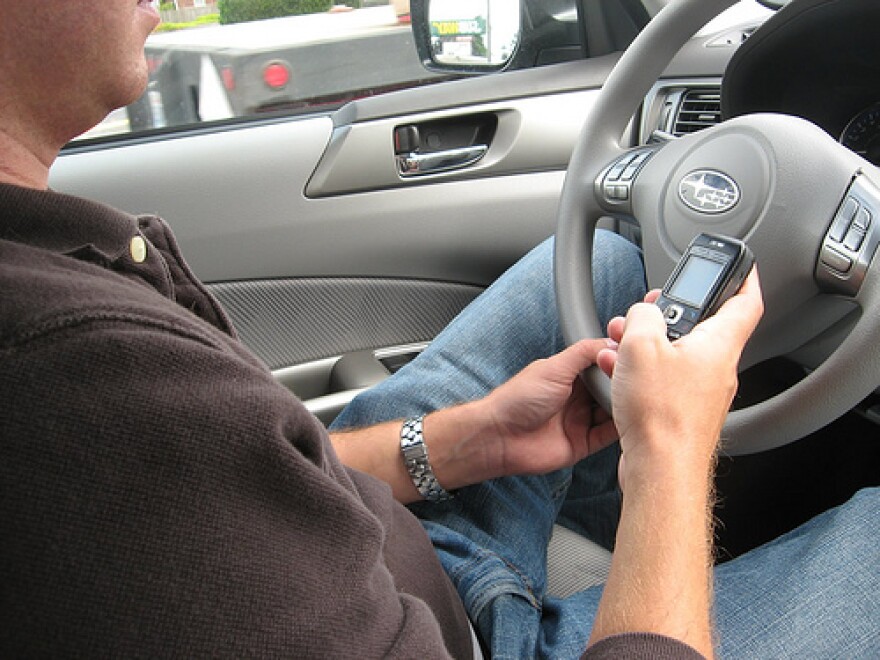Steve Augello lives in Spring Hill Florida, just outside of Tampa. Like a lot of dads, he always made his 17-year-old daughter, Alessandra, check-in with him when she was out. Augello also had a rule.
“You weren’t allowed to have that cell phone out while you’re driving,” Augello remembers telling Alessandra. “I even tested her a few times I called her when she was driving and it always went right through to the recorder.”
On November 10th, 2008, Alessandra called her dad around 7 PM telling him she was about to head home from rehearsal for a school play. That was the last time they spoke. As Alessandra was driving home, 19-year-old Alyssa Dyer suddenly veered across the center line hitting Alessandra head-on and killing them both. Florida Highway Patrol records show a text message went through to Dyer’s boyfriend shortly after the accident.
When Augello got Alessandra’s belongings back later that night, he found her cell phone zipped up in her purse, just like he always told her to do.
From Crash To Law
Augello has been telling this story a lot lately because he’s trying to persuade lawmakers in Tallahassee to pass a ban on texting while driving.
Florida is one of just six states without any ban on texting and driving, even though experts say it makes you 23 times more likely to get into an accident.
Republican Senator Nancy Detert from Venice is trying to change that. This is the fourth year in a row Detert has filed a bill that would make texting and driving a secondary offense. In the past, the legislation had trouble gaining traction but the bill may finally pass this year, partly because there's a version in the House and a new speaker. Both the Senate and House versions are snowballing through their respective committees.
“We don't even need a study,” said Detert. “Everybody who drives the highway on a daily basis sees this everyday of their life and it's outrageously dangerous and needs to be stopped.”
More than two thirds of drivers reported reading a text or email while driving in a 2012 survey by AAA Foundation for Traffic Safety.
In Florida, over 4,500 accidents last year were attributed to drivers being distracted by their cell phones or other electronic communication devices. 255 of those crashes were directly linked to texting. But, those numbers don’t paint a full picture. State law enforcement officials say the issue is under reported and there’s no way to count near misses.
As part of a recent pilot study, researchers at a driving simulation lab at Florida International University asked people to compose text messages while in the driving simulators. Denis McCarthy, who helps run the lab, says participants often weren’t even aware that they were making mistakes.
“It’s the way we’re hardwired,” explained McCarthy. “Humans can do one task really well, but studies have shown when we divide our attention between two tasks, we don’t do either well.”
McCarthy says the research clearly shows that texting and driving causes accidents.
But, where the research is less clear is whether bans on texting and talking on cell phones actually work. Studies investigating that link in other states have turned up mixed results. Some found an increase in overall insurance crash claims after laws were passed. Other studies reported a drop in crashes specifically linked to cell phone use or a decrease in the number of people using their phones while driving where the laws were strictly enforced.
Driving Culture
However, people who want a texting ban say that the point is to change the driving culture. Democratic Senator Maria Sachs supports Senator Detert’s bill. Sachs says when her kids text and drive, she threatens to take off her seatbelt.
“And they’re very concerned about seatbelts,” said Sachs. “See, this is interesting- they grew up with having to put a seat belt on, I didn’t. But they would never get in a car without putting a seatbelt on. We need to make the same education with distracted driving.”
A growing number of people do see it as an issue. AAA reports that nearly 90 percent of surveyed respondents said they believe other drivers using cell phones are a threat to their personal safety.
Last year the The Miami Herald, the Tampa Bay Times and Bay News 9 polled 800 registered Florida voters. Seventy-one percent said they wanted a ban on texting and driving.





